#adhd myths vs reality
Text
ADHD Myths vs. Reality
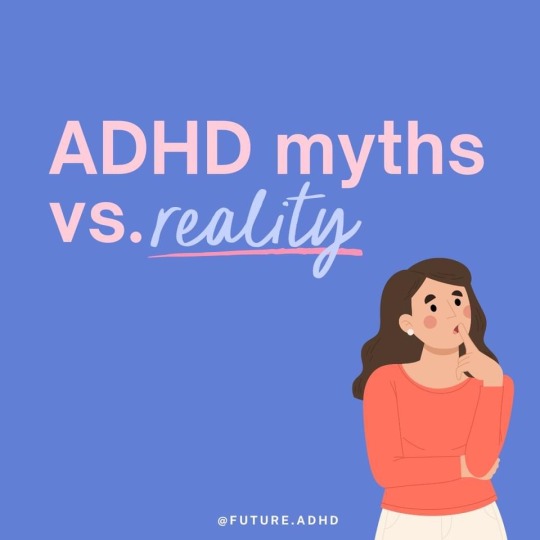





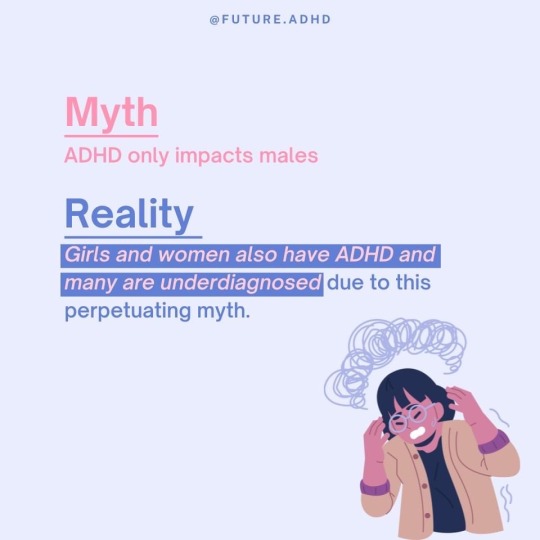
Future ADHD
#adhd#adhd post#adhd myths vs reality#adhd things#adhd traits#adhd does not make you lazy#adhd and hyperfocus#neurodivergence#neurodiversity#actually neurodivergent#feel free to share/reblog#Future ADHD (Facebook)
246 notes
·
View notes
Link
This is a link to a list of guides:
Biology & Ecology
The science in Jurassic Park by microbiologist Mike Hays
Wildlife biology in fiction with Texas biologist Rebecca Mowry
Writing outside the human box, with biology professor Brie Paddock
Zombie microbiology 101 with microbiologist Mike Hays
8 things authors should know about viruses, with HIV expert E.E. Giorgi
Plagues in science fiction and fantasy, with microbiologist Gabriel Vidrine
Insects in fiction: what bugs me, with entomologist Robinne Weiss
Writing wolves fairly & accurately, with environmentalist William Huggins
Gender determination in fantasy creatures, with entomologist Robinne Weiss
Rogue viruses in science fiction, with biomedical researcher Lee A. Everett
A primer on primates for SFF authors, with biomedical researcher Lee A. Everett
Space bugs: microbes in outer space, with microbiologist Mike Hays
The reality of bees, with science reporter and beekeeper Bianca Nogrady
The science of animal communication, with expert William Huggins
Debunking myths about hunting, with wildlife biologist Rebecca Mowry
Writing realistic spiders, with entomologist Robinne Weiss
Venomous creatures from insects to platypus, with Robinne Weiss
Entomology and ants in fantasy, with author Clark Carlton and entomologist Wyatt Parker
Spawning monsters with biology, by biologist Sarah J. Sover
Novel Coronavirus 2019 Roundtable with four expert scientists
Genetics, Archaeology, and Anthropology
Genetics myths in fiction writing by genetics researcher Dan Koboldt
Mutation myths in fiction by geneticist Dan Koboldt
Editing life in science fiction, with microbiologist Mike Hays.
Dispeling archaeology myths, with Graeme Talboys
A whirwind tour of the human genome, by genetics researcher Dan Koboldt
The linguistics in Arrival, by expert linguist Christina Dalcher
Realistic translation in fiction, with archaeologist Marie Brennan.
Neurology & Psychology
Getting mental illness right in fiction with psychiatric NP Kathleen S. Allen
Misconceptions about memory with neurologist Anne Lipton
Dementia myths in fiction, part 1 with neurologist Anne Lipton
Dementia myths in fiction, part 2 with neurologist Anne Lipton.
Writing children with BESD, with special ed teacher Rachel Heaps-Page.
Deep character development, with educational psychologist Maria Grace
It’s not brain surgery, it’s neuroscience, by neuroscientist Paul Regier
Bipolar disorder: What writers should know, with psychiatrist Jon Peeples.
Schizophrenia: What writers should know, with psychiatrist Jon Peeples.
Writing about schizophrenia treatment, by psychiatrist Jonathan Peeples
Writing distinct characters via psycological development, with educational psychiatrist Maria Grace
Autism misconceptions in fiction, with pediatrician Josh Michaels.
Writing characters with ADHD, with pediatrician Josh Michaels
Writer’s guide to tics and Tourette syndrome, with pediatrician Josh Michael
Chemistry and Radiation
Chemical fallacies in fiction with chemist Gwen C. Katz (and husband)
Explosions in science fiction, with chemist Gwen C. Katz (and husband)
Nuclear radiation for writers, with nuclear chemist Rebecca Enzor
The science of poisons, with toxicologist Megan Chaudhuri
Binary poisons in fiction, with emergency/toxicology doctor Jane Prosser.
Physics & Space Travel
9 misconceptions about space travel by aerospace engineer Jamie Krakover
Space flight in science fiction, with aviation expert Sylvia Spruck Wrigley.
The weapons of Star Wars, with astronomical engineer Judy L. Mohr
Fiction writing versus physical laws, with chemist Gwen C. Katz
Cryopreservation in science fiction, with researcher Terry Newman
Realistic astronomy in science fiction, with astronomer Tom Benedict
Faster-than-light travel in sci-fi, with physicist Jim Gotaas.
Imaging over long distances, with astronomical engineer Judy L. Mohr.
Relativity: Did Einstein kill steampunk? with physicist Dan Allen.
Practical spaceship design, by Boeing engineer Eric Primm.
Exoplanets and habitability, by physicist Jim Gotaas.
Radio waves for sci-fi authors, with atmospheric physicist Candida Spillard.
Distance and legal systems in sci-fi, with “space lawyer” J.R.H. Lawless.
Space law: lowering the cost of space travel, with “space lawyer” J.R.H. Lawless.
Space battles in sci-fi, with veteran U.S. Army officer Michael Mammay
Interstellar space law: who owns Oumuamua? with lawyer J.R.H. Lawless
Lunar travel to the moon and back, with astrophysicist Jim Gotaas
Earth Sciences
Near-future scenarios for us & our planet, with science reporter Bianca Nogrady
How the ocean will kill you, with marine biologist Danna Staaf.
Habitable atmospheres for authors, by atmospheric scientist Lynn Forest.
Gravity basics for SFF authors, by physicist Dan Allen.
The future of energy, by geophysicist Karen Lanning.
Earthquakes: Fact vs fiction, by civil engineer Amy Mills.
Climate change and cli-fi, by geophysicist Karen Lanning
Waste management in SF, with expert Gareth Jones.
Enclosed ecosystems and life support, with biomedical scientist Philip Kramer.
Computers & Technology
Ability and luck in writing with biostatistician Dustin Fife
Computer and internet myths, with computer scientist Matt Perkins.
Your sci-fi cell phone isn’t cool enough, with silicon valley consultant Effie Seiberg.
CGI is not made by computers, by 3D video game artist Abby Goldsmith.
Erroneous code in fiction, by programmer KJ Harrowick
7 things to know about cybernetics, with neuroscientist Benjamin Kinney.
Writing believable nanotechnology, with physicist Dan Allen.
Holograms in sci-fi, with Judy L. Mohr
State-of-the Art Microscopes with microscopist Terry Newman
A writer’s guide to cyborgs, by biomedical expert Brie Paddock
Analog versus digital imaging, by astronomical engineer Judy L. Mohr
Quantum computing & cryptography I by physicist Dan Allen
Quantum computing & cryptography II by physicist Dan Allen
The current state of artificial intelligence by industry expert Dan Rowinski
Common misconceptions about AI, an interview with expert Ben Taylor
Machine learning for writers, with software developer Ember Randall
The future of communications, with expert S.B. Divya
GPS systems: What authors should know, with engineer Judy L. Mohr
Big brother is watching: surveillance & privacy, by Google developer Ember Randall.
Research and Medicine
Medical misconceptions in fiction, with nurse Karyne Norton
Proper lab technique for SFF writers with nuclear chemist Rebecca Enzor.
Research in writing: How to ask an expert, with Boeing engineer Eric Primm
Researchers gone wild, with laboratory manager Gabriel Vidrine.
How to write convincing death scenes, with science reporter Bianca Nogrady.
More medical myths in fiction, with nurse Stephanie Sauvinet.
Organogenesis in 3D, with biomedical researcher Megan Chaudhuri.
Immortality in science fiction, with clinical researcher Edward Ashton
The near-future of medical technology, with physician assistant Rachel Berros
First aid and Field Dressings for Writers with medical expert Stacey Berg.
How to write about biomedical researchers, with genetics researcher Dan Koboldt
Nursing myths in fiction, with nurse Stephanie Sauvinet
Writing realistic research labs, with scientist Jenny Ballif
Research ethics in science fiction, with scientist Dan Koboldt
Drug development for writers, with research scientist Bradley Johnson.
Binary poisons in fiction, with toxicology expert Jane Prosser
The science of aging and its fictional cures with biomedical scientist Philip A. Kramer
Sights, sounds, and smells of the lab with scientist Rachel Brick
Emergency triage: bring out your dead, by ER physician assistant Rachel Berros
Futuristic first aid: wound care, by ER physician assistant Rachel Berros
Roundtable on the novel coronavirus, with a panel of four scientists.
COVID-19 and the American pandemic, by Dan Koboldt
Fact in Fantasy (#FactInFantasy)
Here are articles related to culture, animal husbandry, warfare, and other relevant topics for fantasy authors.
Fantasy Cultures
Developing realistic fantasy cultures with sociologist Hannah Emery
A quick and dirty guide to feudal nobility, with history buff Jerry Quinn
France as a fantasy culture, by itinerant francophone Dan Koboldt.
Female professions of medieval Europe, by Renaissance man Jerry Quinn.
Religious fundamentalism in fantasy, by Crusades hobbyist Spencer Ellsworth.
Historically accurate ways to die, by historian Wanda S. Henry
Women’s voices from Heian Japan, by David and Carol Harr
Prophets, preachers, and parasites in fantasy, with historian Jay S. Willis
World-building
10 things authors don’t know about the woods by bowhunter Dan Koboldt
Worldbuilding: basics of social stratification, with sociologist Hannah Emery
Languages in fiction, with linguistic expert Christina Dalcher.
Woodworking myths in fiction, by craftsman Dustin Fife.
Writing realistic forests, with surveyor Terence Newman
World building with the Spanish Inquisition with historian Jay S. Willis
5 Facts About the American Old West, with historian Hayley Stone.
Folklore systems in fantasy, with historian Colleen Halverson.
Money and economics for SF/F writers, with decision scientist Elise Bungo
Political philosophies for fictional worlds, with political scientist Kate Heartfield
World building with food and drink in fiction, with culinary expert Crystal King
Organic world-building through ecology with biologist Sarah J. Sover.
Spawning monsters with biology, with biologist Sarah J. Sover
Plants in World-building: Cacao Case Study with expert Amber Royer
How to name characters in fantasy, with naming consultant Hannah Emery
Magic
Designing realistic magic academies by sociologist Hannah Emery.
Witchcraft for Writers, with Renaissance historian E.B. Wheeler.
Superstition for Writers, with Renaissance historian E.B. Wheeler.
A brief history of real-world magic, with historian Jay S. Willis.
Horses, Travel, and Adventure
Horses in fantasy writing by rancher and horse trainer Karlie Hart
How to describe horses in fiction, with expert equestrian Amy McKenna
Horse terminology: gaits and anatomy, with expert equestrian Amy McKenna
Horse terminology: tack and riding, with expert equestrian Amy McKenna
3 ways to write a better hike, by outdoors editor Victoria Sandbrook Flynn
How to write rock climbing wrong, with longtime climber Michelle Hazen.
Matching horses to use, setting, and character, with expert Rachel A. Chaney.
How to injure horses realistically with expert Rachel A. Chaney
8 ways to write horses wrong with expert Rachel A Chaney
Wilderness, Weapons and Warfare
Wilderness survival tips, by Montana ranger Rebecca Mowry
Medieval versus modern archery by bowhunter Dan Koboldt
A short history of warfare in the western world, with historic actor Jerry Quinn
Weapons and tactics in fantasy warfare, with veteran/historian Michael Mammay.
Realistic fighting for SF/F authors, by martial artist Eric Primm.
Realistic knife fighting, with martial artist Eric Primm
Building a fantasy army: Leaders, by veteran officer Michael Mammay.
Building a fantasy army: Soldiers, by veteran officer Michael Mammay.
8 tips for writing realistic soldiers, by veteran officer Michael Mammay.
#guides for writers#myths in fantasy#military guide for fantasy writers#guides for fantasy writing#writing resources#worldbuilding
137 notes
·
View notes
Text
The Potential Dangers of Diagnosing Characters
For as long as I’ve thought about how much anime/manga characters have helped my mental health, I wonder what does it means to talk about said characters in a way that helps someone else’s mental health improve.
With a lot of growing acceptance around mental health in the past few years, there’s something that bothers me a bit and I realize it’s something that we have to be careful of as well.
DC Comics published a limited series from September 2018-May 2019 called Heroes in Crisis, which focused on its universe of heroes dealing with mental health issues (mostly PTSD) in a hospice known as the Sanctuary. A psycholoanalyst was hired to come up with fictional diagnoses for some of the heroes. Batman, Superman, Wonder Woman all had various mental disorders listed on their profiles from major depression to adjustment disorder.
Initially, this shook a clinical psychology who uses superheroes as a part of her therapy as she felt that we can’t label someone with a mental health disorder just because they show symptoms of it. Dr. Janina Scarlet, the creator of Superhero Therapy, criticized the diagnoses.
From her post at Psychology Today:
“Perspective taking can actually help foster empathy building and compassion toward others. However, diagnosing characters or people whom therapists have not evaluated in a session can be risky.
Sure, some fictional characters, such as Storm from the X-Men, are known to struggle from certain disorders (e.g., claustrophobia, fear of tight spaces). On the other hand, other characters, such as Batman, who experienced traumatic events (i.e., loss of his parents) do not necessarily meet the criteria for a mental health disorder. Sure, Batman may display and exhibit certain symptoms, which can be found across certain disorders, including PTSD and depression disorders.
However, for someone to be diagnosed with a disorder, they have to meet the required criteria of symptoms over a set amount of time AND these symptoms need to be dysfunctional enough to warrant a mental health diagnosis (i.e., these symptoms get in the way of the individual's functions, such as work, school, social, etc.).
DC Comics recently hired a mental health professional to psychoanalyze popular comic-book characters, such as Batman, Superman, Harley Quinn, and others. Personally and professionally, I believe that providing mental health education using fictional characters can be extremely helpful in assisting people in understanding mental health and recovery.
HOWEVER, such education practices must be handled delicately and appropriately. In diagnosing characters with mental illness without an explanation, without evidence, and in such a blasé format grossly misrepresents mental health and poses a threat to further pathologize mental health for those who actually struggle with these disorders in real life.”
I’m not a mental health professional and here I am, talking about fictional characters with possible trauma and mental health issues. No worries, right? That’s when I remembered something I wrote a long while ago.
8 years ago, I wrote my first post about Yotsuba&! Let’s just say it wasn’t a really great one in hindsight. I hinted that Yotsuba Koiwai had ADHD. The language I wrote in that post suggested she totally had ADHD and Kiyohiko Azuma did this on purpose. I didn’t provide any hard evidence that this was the case. A reader left a comment saying that I had a misinformed opinion about her. They were right. To this day, I felt that what I wrote about Yotsuba at the time was a horrible attempt at playing doctor.
I insulted kids with ADHD issues by comparing them to a fictional child who’s just very hyperactive in general. It was ignorant of me to do so and I’m really sorry about it.
To say a fictional character has mental illness with no solid proof really hurts someone who has mental illness. It gives off the impression that everyone with that mental illness is similar to one another when that’s far from the truth. You only get a part of the story that only serves the person sharing it. There’s always the possibility that there’s more to the story than just mental illness.
All views have to be considered. Giving some sort of unofficial diagnosis doesn’t allow multiple perspectives. I’m sure there are people who watched movies and saw poor representations of mental illness on screen and then go, “Wow, is that what it’s really like? That’s all I need to know right there!” Next thing you know, they say something very insensitive towards a person with mental illness due to media influence.
Around late last year, I went to an Attack on Titan trivia night event. I had a great time as I met some fun people to talk to. So I was talking about what I do on my blog with a person at the event and we were discussing Eren Jeager’s demeanor as of the events that happened in Attack on Titan Volume 27. This person said something that made me irk a bit.
“I know. Eren’s so bipolar!”
I was coming off the heels of taking Mental Health First Aid training and felt that response maybe wasn’t the best thing to be said. Eren’s totally NOT bipolar, but I get why the person said it. It feels a bit too natural to say some things in a cozy way when we have no education about them. Psychology is also a field that’s filled with a lot of pop science and BS. I don’t think shaming those people solves anything.
I wanted to talk about the whole “diagnosing characters” for a while now because there’s various geek psychology outlets that talk about the mindset/trauma behind fictional characters. Even psychologists that aren’t geeks try their hands at diagnosing characters for fun. Yet after a year where I learn more about mental illness vs. mental health and how much pain families of those with serious mental illness are in, am I running around preaching pseudoscience?
I ask this because I’ve spoken to a few readers of my blog who have asked me for help for their inner trauma. I worry that I’ve given off the wrong impression that I’m a licensed professional. It’s unfortunately easy to pass off as an expert thanks to the internet’s ability to allow someone to come up with enough fluff to become popular.
But at the very least, I will admit that I’m not one. I’m also not ashamed to admit that I may be wrong and don’t know everything. I keep learning every moment about what’s out there. Just like I keep my eyes open about all kinds of manga series and their various characters that become a part of our lives in meaningful ways.
Fiction of all kinds (from classic literature to manga) touches many lives. We can’t help but compare characters to ourselves and others. Just don’t generalize your/their situations with everyone else because each and every one of us are unique and complicated. Don’t develop a sense of survivorship bias. Life may or may not be as messy as you might think. Be careful about spreading mental health myths (i.e. chemical imbalance causes depression). Ask yourself if what you hear is valid and whether that information is truthful enough to be worth hearing.
I’m still going to keep talking about manga characters and their life situations not because it’s “fun.” It’s something that helped me realize important things over time. If there’s one thing I learned from reading shonen manga all these years, it’s that you learn and grow in order to potentially help protect a group of people in need one day. To me, that group is a community of individuals who have mild-to-serious mental health issues.
I will be responsible though as fiction isn’t reality. Another shonen principle is to not categorize those who are considered losers, but are just people like us trying to find their way.
After all, in the real world and fictional world, we can strive to never be completely defined by our labels and diagnoses when faced with danger.
#mental health#fandom#manga#anime#mental health representation#diagnosis#psychology of characters#psychology of fiction
10 notes
·
View notes
Text
Podcast #338: How to Beat Distraction and Stay Focused
If you’re like me, you have a love-hate relationship with your digital devices. On the one hand, they give us access to unlimited amounts of information, connect us with friends and family, and allow us to work from pretty much anywhere. On the other hand, they can captivate our attention so much that we feel distracted and angsty. And try as we might, we often find it hard to ignore the itch to stop scrolling through Instagram and really listen to what a loved one is saying. Why do these devices feel so dang addictive? My guest today is a neuroscientist who’s studied that question in depth. His name is Adam Gazzaley and he’s the author of The Distracted Mind, as well as the founder of Gazzaley Labs at the University of California at San Francisco. There, he and his team have researched what goes on in our brains when we use our digital devices, why they distract us, and what we can do about it. Today on the show, Adam and I discuss the science of distraction and focus. Adam walks us through the cognitive functions we use to focus our attention and to avoid distraction. He then explains why these evolved cognitive functions are mismatched to today’s constantly buzzing digital devices, using a theory of optimal food foraging borrowed from biology. We then discuss action steps grounded in science on how you can beat distraction and stay more focused throughout the day. We end our conversation talking about Adam’s work creating prescription video games (yes, prescription) that can be used to help elderly patients and individuals with ADHD. Show Highlights * What research on aging can teach us about memory and distractability * The science of distraction — why and how it happens * What is “goal interference”? * The 3 most important skills in successfully achieving your goals * What hinders our ability to pay attention? * Top-down vs. bottom-up attention * The ways in which technology can actually help our attention, especially as we age * Applying the “optimal foraging theory” to the idea of distraction * Are tech companies intentionally making their software addicting? * Advice for people who feel addicted to their smartphones/tech * Why you should decrease your accessibility * How to manage your boredom and anxiety * How video games can help you recapture your ability to focus (as well as those with ADHD) Resources/People/Articles Mentioned in Podcast * How to Improve Your Working Memory * How to Memorize Anything * Podcast: Becoming an Individual in an Age of Distraction * Podcast: The Value of Deep Work * Podcast: Solitude and Leadership * Our 3-part series on Attention * 12 Concentration Exercises from 1918 * Decluttering Your Digital Life * How to Quit Mindlessly Surfing the Internet and Actually Get Stuff Done * The Complete Guide to Quitting Your Smartphone Habit * 4 Questions to Crush FOMO * Podcast: The Joy of Missing Out * Work When You Work; Play When You Play * Podcast: The Science of Behavior Change * Podcast: ADHD Myths and Realities In The Distracted Mind, Adam does a great job breaking down what goes on in our brain when we’re distracted, but more importantly provides researched-backed insights on what you can do to be less distracted. Connect With Adam Adam’s website Adam on Twitter Adam on Instagram Achilles’ Interactive Listen to the Podcast! (And don’t forget to leave us a review!) Listen to the episode on a separate page. Download this episode. Subscribe to the podcast in the media player of your choice. Podcast Sponsors Art of Charm Podcast. One of the few podcasts I listen to when not recording my own. Their recent interview with a Russian spy is not to be missed. Check out all they have to offer at www.artofcharm.com. Mack Weldon. Their underwear and undershirts are second to none. If you don’t like your first pair, you can keep it, and they will still refund you. No questions asked. Go to MackWeldon.com and get 20% off your purchase using the promo code MANLINESS. Casper Mattress. Get a better night’s sleep without the usual hassle of mattress shopping. Get $50 toward any mattress purchase by visiting www.casper.com/MANLINESS and using offer code MANLINESS. Click here to see a full list of our podcast sponsors. Read the Transcript Coming soon! The post Podcast #338: How to Beat Distraction and Stay Focused appeared first on The Art of Manliness. http://dlvr.it/PmYSpq
6 notes
·
View notes
Text
ADHD Myths vs. Reality
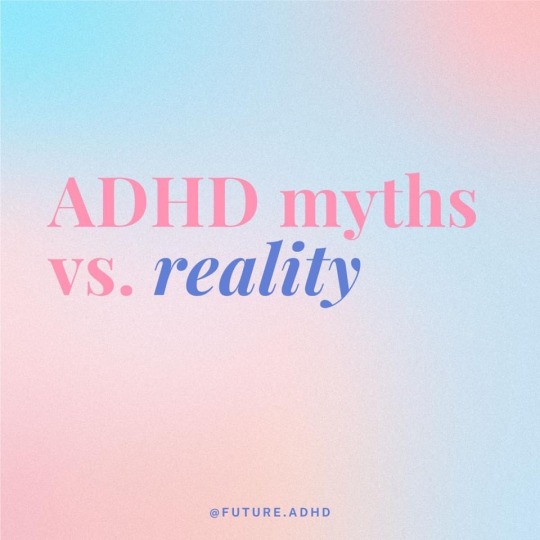
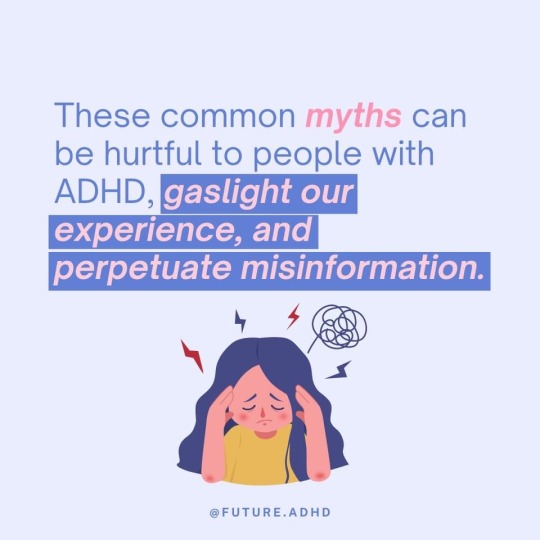
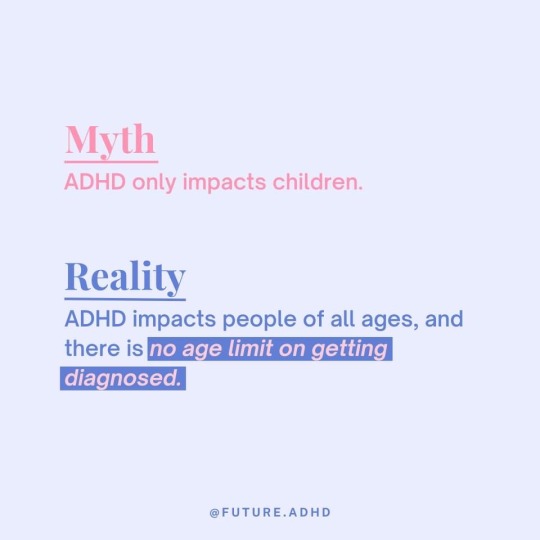
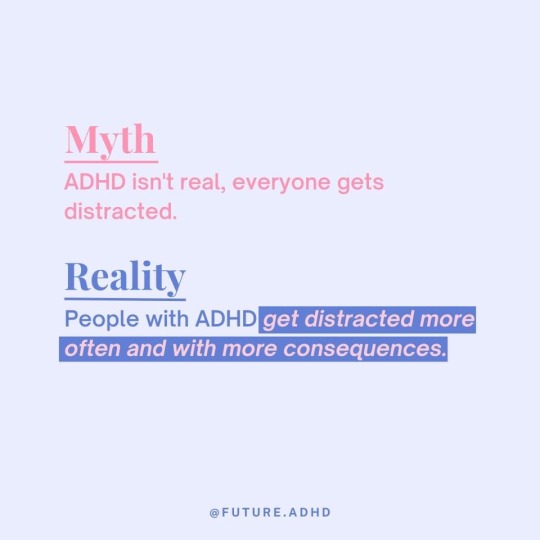
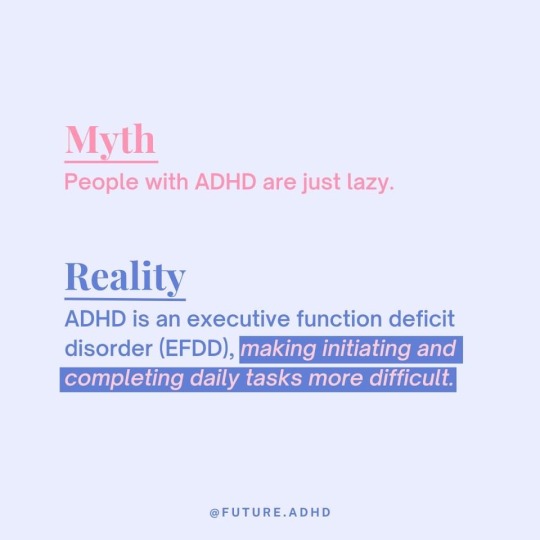
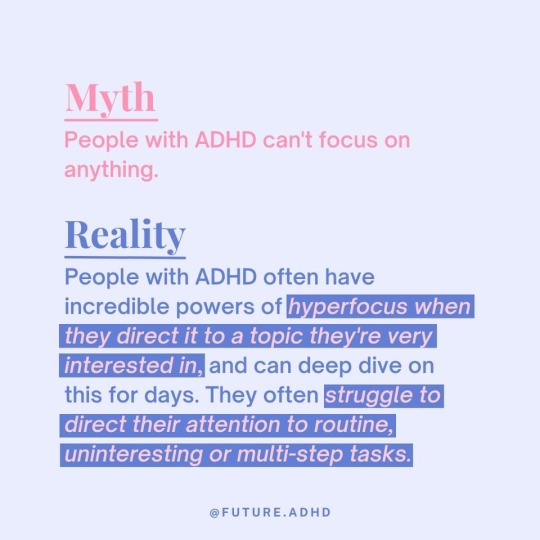
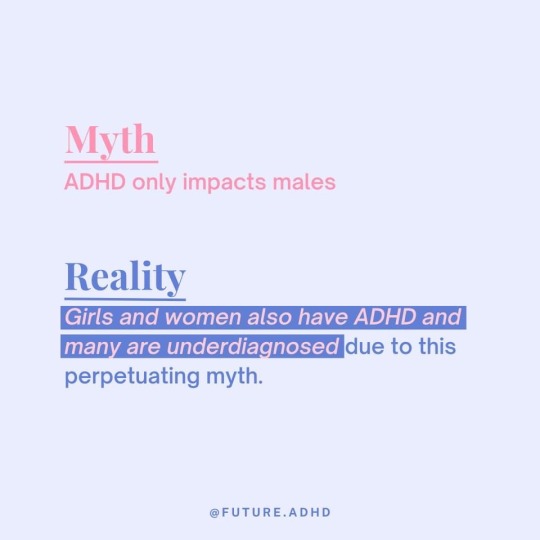
Future ADHD
#adhd#adhd post#adhd myths#adhd awareness#neurodiversity#feel free to share and reblog#future adhd (facebook)
286 notes
·
View notes
Text
ADHD Myths vs. Reality
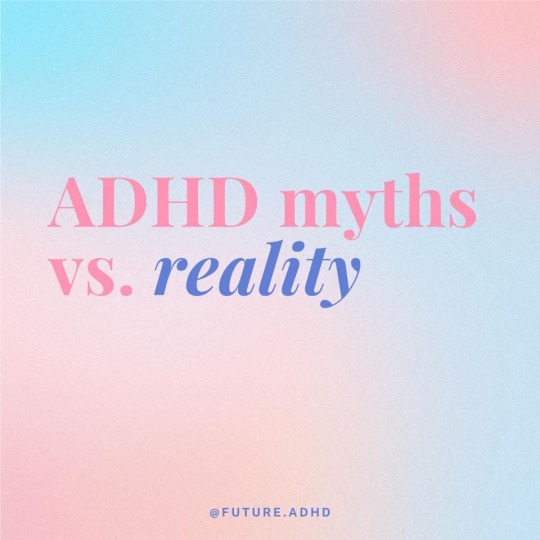
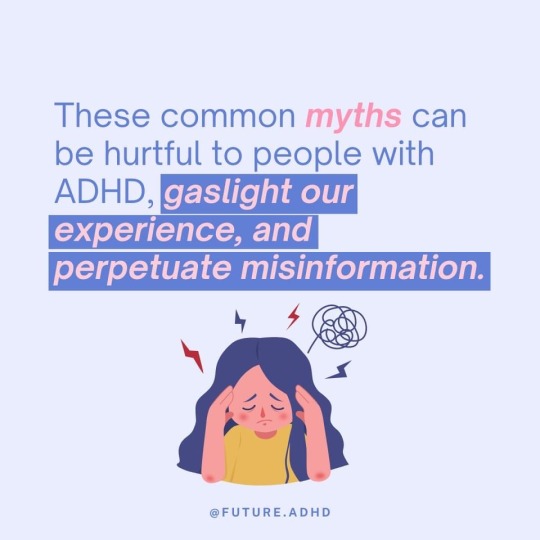
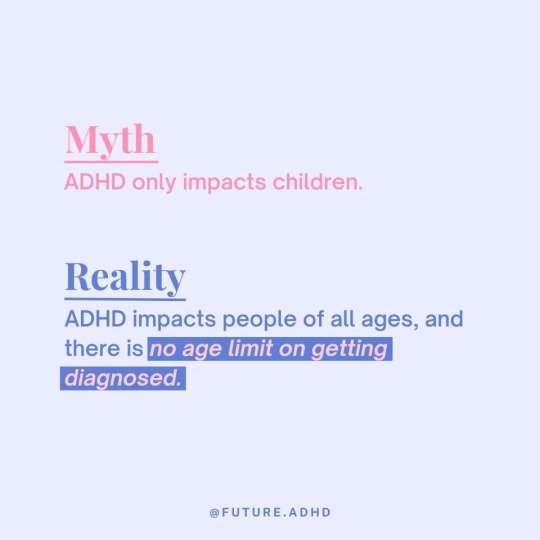
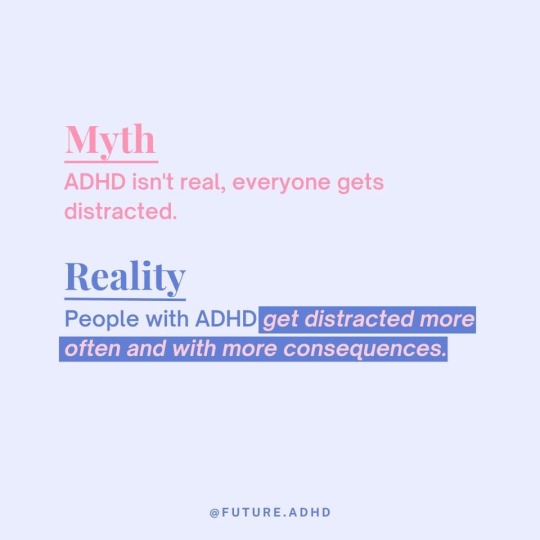
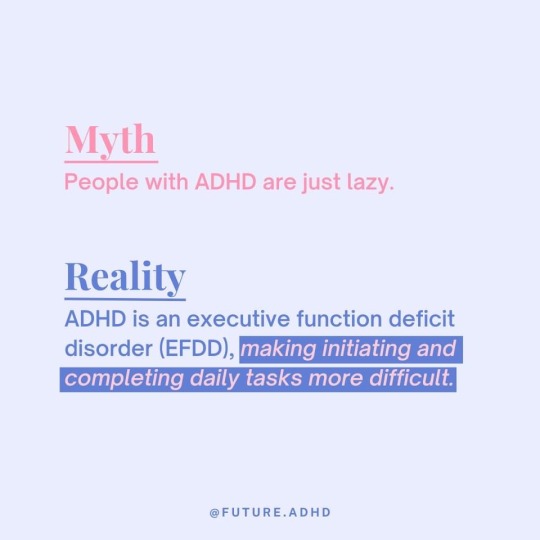
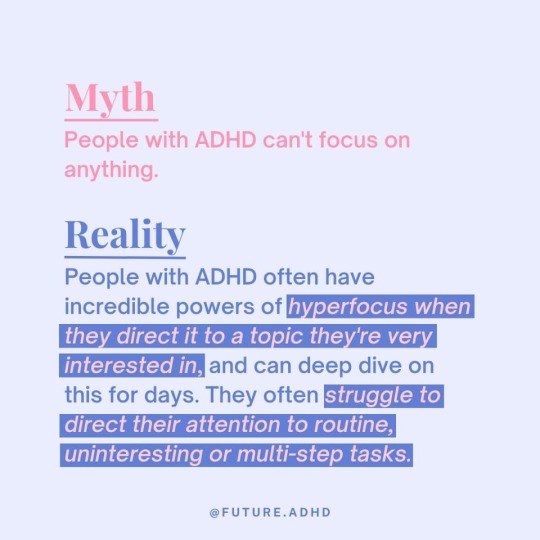
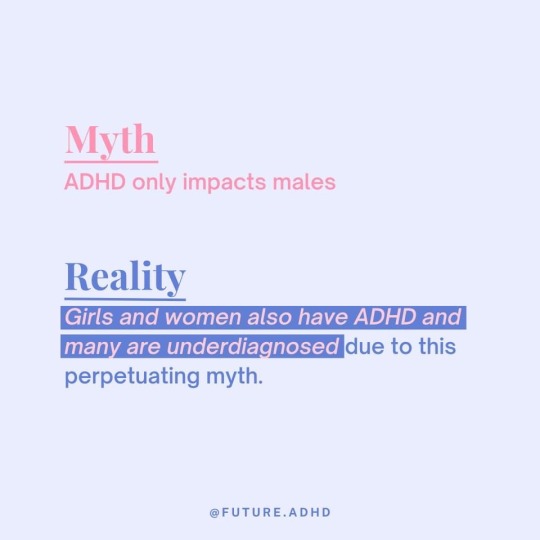
Future ADHD
#adhd#adhd post#adhd information#myth vs facts#adhd acceptance#neurodivergence#neurodiversity#feel free to share/reblog#Future ADHD (Facebook)
247 notes
·
View notes